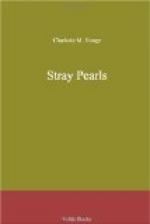As she left the Cathedral, and passed M. de Comminges, a lieutenant of her Guards, she said: ‘Go, and Heaven be with you.’
I was soon at home safely with my boys, to carry an account of our doings to my dear little M. d’Aubepine, who, unable to bear the fatigue and the crush of Notre Dame, had taken her little children to a Mass of thanksgiving celebrated by our good Abbe at the nearest Church.
We waited long and long for the others to come. I was not uneasy for my mother, who was with the Queen; but the servants brought reports that the canaille had risen, and that the streets were in wild confusion. We could see nothing, and only heard wild shouts from time to time. What could have become of Eustace and Annora? My mother would have been afraid that with their wild English notions they had rushed into something most unsuitable to a French demoiselle, and I was afraid for Eustace, if they were involved in any crowd or confusion, for his strength was far from being equal to his spirit. We watched, sure that we heard cries and shouts in the distance, the roar of the populace, such as I remembered on that wedding day, but sharper and shriller, as French voices are in a different key from the English roar and growl.
It passed, however, and there was long silence. Gaspard and Armantine stood at the window, and at last, as evening twilight fell, cried out that a carriage was coming in at the porte cochere. Presently Annora ran into the room, all in a glow, and Eustace followed more slowly.
‘Have you been frightened?’ she cried. ’Oh, we have had such an adventure! If they had not screamed and shrieked like peacocks, or furies, I could have thought myself in England.’
‘Alack! that a tumult should seem like home to you, sister,’ said Eustace gravely.
Then they told how at the ambassador’s chapel they had heard that good Lady Fanshawe, whom they had known in England, had arrived sick and sad, after the loss of a young child. They determined, therefore, to steal away from Notre Dame before the ceremony was over, and go to see whether anything could be done for her. They could not, however, get out so quickly as they expected, and they were in the Rue de Marmousets when they saw surging towards them a tremendous crowd, shouting, screeching, shrieking, roaring, trying to stop a carriage which was being urged on with six horses, with the royal guards trying to force their way. Eustace, afraid of his sister being swept from him, looked for some escape, but the mob went faster than they could do; and they might soon have been involved in it and trampled down. There seemed no opening in the tall houses, when suddenly a little door opened close to them, and there was a cry of surprise; a hand was put out.
‘You here! Nay, pardon me, Mademoiselle; take my arm.’
Clement Darpent was there. A few steps more, and taking out a small key, he fitted it into the same little door, and led them into a dark passage, then up a stair, into a large room, simply furnished, and one end almost like an oratory. Here, looking anxiously from the window, was an old lady in a plain black dress and black silk hood, with a white apron and keys at her girdle.




